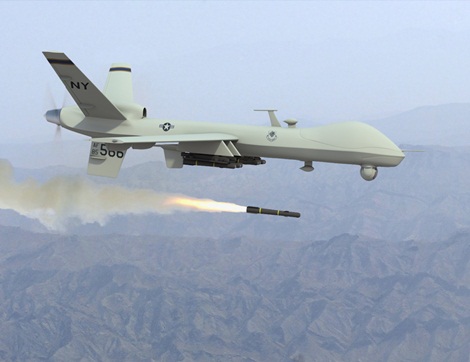
• The U.S. is interested in Yemen solely for its strategic location. Its oil reserves are due to run out in approximately five years.
By Richard Walker —
While much of the media focus has been elsewhere, two secret wars are being fought in Yemen by the United States, Saudi Arabia and Israel.
For several years, U.S. Special Forces and the Central Intelligence Agency, with the support of Yemen’s president, Ali Abdullah Saleh, have launched hundreds of drone attacks against alleged Islamists. At the same time, the Saudis have fought against Shiite tribesmen in the north, claiming they are financed by Iran and will link up with Shiites in Saudi Arabia to attack its oil fields. In 2009, the Saudis sent an invasion force into Yemen, killing hundreds of tribesmen.
To understand why Yemen, a nation of 24 million people, is strategically vital, one has to look at its location. The nation’s small oil reserves are due to run out in approximately five years. Yemen faces Djibouti and Eritrea, across the narrowest part of the Red Sea, where it enters the 20-mile-wide Mandab Strait, known in Arabic as the Bab-el-Mandab (“Gate of Grief.”)
If the Mandab were to be closed, much like the Strait of Hormuz in the same region, the price of oil would skyrocket. Closure would lock down all traffic from the Mediterranean through the Suez Canal to the Red Sea, where it makes its way to the Mandab before reaching the Gulf of Aden and the Indian Ocean. Much of Saudi Arabia’s oil is shipped through the Red Sea; so too are Israel’s imports and exports.
The vulnerability of the Mandab is well known. In 2002, for example, suicide bombers in a small boat rammed a French tanker, releasing a large quantity of oil. The subsequent closure of the Mandab for a cleanup was short but costly.
The Israelis, in conjunction with the Saudis and other Arabs in the region, have persuaded the Obama White House and Washington hawks that Yemen is an important prize. The Israelis have also provided intelligence to the Saudis about Shiite tribesmen in the north of the country and have helped the U.S. identify targets for drone strikes. The Saudis are worried that Yemen, whose population is equally divided between Shiites and Sunnis, could split apart, creating a Shiite-led part of the country located close to its border and oil fields.
The secret wars have all taken place against a bizarre political backdrop, with Washington and Riyadh supporting the corrupt president of the country, who tortured and killed opponents of the regime.
Students of history know Washington savagely cut aid to Yemen following the Cold War. It was only after Obama and his predecessor, George W. Bush, took the advice of the Saudis and Israelis to make Yemen a military priority that massive aid flowed into Yemen’s government coffers. That will not have been lost on the Yemeni opposition, who heard nothing from Obama throughout most of 2011. Many young Yemeni protesters will not forget how Obama ignored their “Arab spring” as he and the Saudis backed a corrupt president and a vicious military regime.
Richard Walker is the pen name of a former N.Y. news producer.

